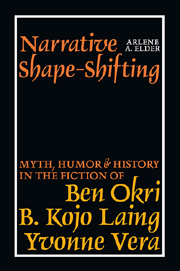 Narrative Shape-Shifting
Narrative Shape-Shifting 3 - Yvonne Vera & the Womanist Claims of ‘History’
Published online by Cambridge University Press: 05 April 2013
Summary
Art is the telling of truth and is the only available method for the telling of certain truths. (Irene Staunton)
I would like to be remembered as a writer who had no fear for words and who had an intense love of her nation. (Yvonne Vera)
It would be an exaggeration to claim that ‘history’ is ‘almost a character’ in Yvonne Vera's novels; nevertheless, all of her figures, major or minor, have been profoundly affected by the turbulence in Rhodesia/Zimbabwe during its colonial takeover and occupation, one of its two Chimurengas (the wars for independence of 1896 and 1964– 1979), and/or their bloody aftermath. Male or female, her protagonists, even if not active participants in these upheavals, are marked by the violence of colonialism and the difficult transition from traditional to modern culture that it wrought, especially the socially and psychologically devastating decline of communalism. After independence, the Shona government's genocide against the Ndebele, alleged political threats in Matabeleland, and its rewriting of what happened following the war of liberation in order to deny that this slaughter occurred ironically produced a condition for many citizens comparable to that of European imperialism: a silencing that continues to this day.
- Type
- Chapter
- Information
- Narrative Shape-ShiftingMyth, Humor and History in the Fiction of Ben Okri, B. Kojo Laing and Yvonne Vera, pp. 95 - 147Publisher: Boydell & BrewerPrint publication year: 2009


